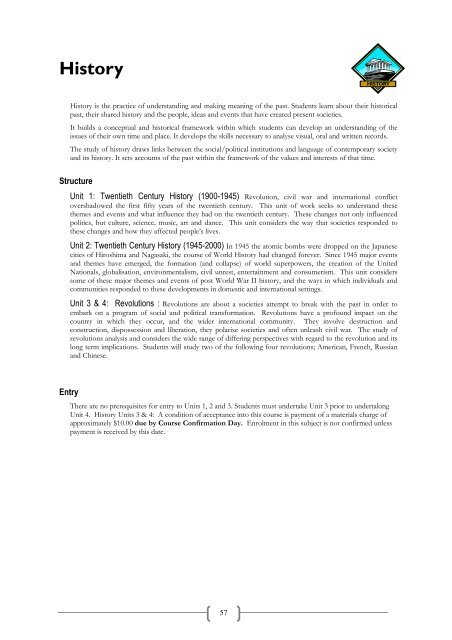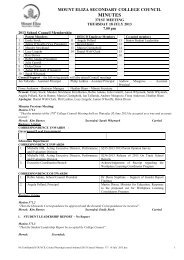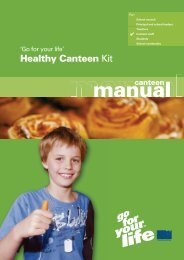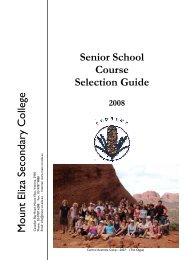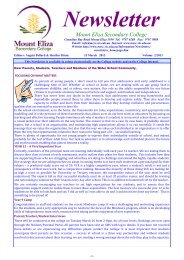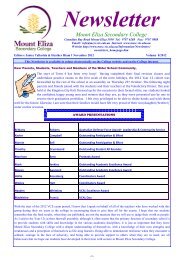9-12 Course Selection Guide - Mount Eliza Secondary College
9-12 Course Selection Guide - Mount Eliza Secondary College
9-12 Course Selection Guide - Mount Eliza Secondary College
You also want an ePaper? Increase the reach of your titles
YUMPU automatically turns print PDFs into web optimized ePapers that Google loves.
HistoryHistory is the practice of understanding and making meaning of the past. Students learn about their historicalpast, their shared history and the people, ideas and events that have created present societies.It builds a conceptual and historical framework within which students can develop an understanding of theissues of their own time and place. It develops the skills necessary to analyse visual, oral and written records.The study of history draws links between the social/political institutions and language of contemporary societyand its history. It sets accounts of the past within the framework of the values and interests of that time.StructureUnit 1: Twentieth Century History (1900-1945) Revolution, civil war and international conflictovershadowed the first fifty years of the twentieth century. This unit of work seeks to understand thesethemes and events and what influence they had on the twentieth century. These changes not only influencedpolitics, but culture, science, music, art and dance. This unit considers the way that societies responded tothese changes and how they affected people’s lives.Unit 2: Twentieth Century History (1945-2000) In 1945 the atomic bombs were dropped on the Japanesecities of Hiroshima and Nagasaki, the course of World History had changed forever. Since 1945 major eventsand themes have emerged, the formation (and collapse) of world superpowers, the creation of the UnitedNationals, globalisation, environmentalism, civil unrest, entertainment and consumerism. This unit considerssome of these major themes and events of post World War II history, and the ways in which individuals andcommunities responded to these developments in domestic and international settings.Unit 3 & 4: Revolutions : Revolutions are about a societies attempt to break with the past in order toembark on a program of social and political transformation. Revolutions have a profound impact on thecountry in which they occur, and the wider international community. They involve destruction andconstruction, dispossession and liberation, they polarise societies and often unleash civil war. The study ofrevolutions analysis and considers the wide range of differing perspectives with regard to the revolution and itslong term implications. Students will study two of the following four revolutions; American, French, Russianand Chinese.EntryThere are no prerequisites for entry to Units 1, 2 and 3. Students must undertake Unit 3 prior to undertakingUnit 4. History Units 3 & 4: A condition of acceptance into this course is payment of a materials charge ofapproximately $10.00 due by <strong>Course</strong> Confirmation Day. Enrolment in this subject is not confirmed unlesspayment is received by this date.57


